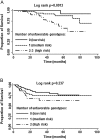GWAS-identified colorectal cancer susceptibility loci associated with clinical outcomes
- PMID: 22505654
- PMCID: PMC4072910
- DOI: 10.1093/carcin/bgs147
GWAS-identified colorectal cancer susceptibility loci associated with clinical outcomes
Abstract
Recent genome-wide association studies (GWAS) have identified several common susceptibility loci associated with the risk of colorectal cancer (CRC). However, whether these loci affect clinical outcomes of CRC is not clear. In this study, we genotyped 26 single nucleotide polymorphisms (SNPs) in 10 GWAS-identified CRC susceptibility regions and evaluated their associations with survival and recurrence in 285 stage II and III patients receiving fluorouracil-based adjuvant chemotherapy. Only one SNP, rs10318 (15q13.3), was significantly associated with recurrence for patients with stage II disease. Three SNPs: rs10749971 (11q23.1), rs961253 (20p12.3) and rs355527 (20p12.3) in two regions were significantly associated with recurrence for patients with stage III disease. Five SNPs: rs961253 (20p12.3), rs355527 (20p12.3), rs4464148 (18q21.1), rs6983267 (8q24.21) and rs10505477 (8q24.21) in three regions were significantly associated with survival for patients with stage III disease. Cumulative effects of multiple unfavorable genotypes were observed for recurrence and survival in patients with stage III CRC. Our results suggest that cancer susceptibility loci may also affect the prognosis of CRC patients receiving fluorouracil-based adjuvant chemotherapy.
Figures
Comment in
-
One SNP for both cancer risk and survival in colorectal cancer: two for the price of one?Pharmacogenomics. 2012 Jul;13(10):1114. Pharmacogenomics. 2012. PMID: 23077730 Free PMC article. No abstract available.
Similar articles
-
Association studies on 11 published colorectal cancer risk loci.Br J Cancer. 2010 Aug 10;103(4):575-80. doi: 10.1038/sj.bjc.6605774. Epub 2010 Jul 20. Br J Cancer. 2010. PMID: 20648012 Free PMC article.
-
Colorectal cancer susceptibility loci in a population-based study: Associations with morphological parameters.Am J Pathol. 2010 Dec;177(6):2688-93. doi: 10.2353/ajpath.2010.100298. Am J Pathol. 2010. PMID: 21119214 Free PMC article.
-
Colorectal cancer susceptibility loci on chromosome 8q23.3 and 11q23.1 as modifiers for disease expression in Lynch syndrome.J Med Genet. 2011 Apr;48(4):279-84. doi: 10.1136/jmg.2010.079962. Epub 2010 Nov 19. J Med Genet. 2011. PMID: 21097774
-
Colorectal Cancer Risk Loci: Prognostic Factors for Clinical Outcomes? A Systematic Review and Meta-Analysis.Cancer Rep (Hoboken). 2025 May;8(5):e70230. doi: 10.1002/cnr2.70230. Cancer Rep (Hoboken). 2025. PMID: 40387276 Review.
-
Cumulative evidence for relationships between multiple variants in 8q24 and colorectal cancer incidence.Medicine (Baltimore). 2018 Aug;97(35):e11990. doi: 10.1097/MD.0000000000011990. Medicine (Baltimore). 2018. PMID: 30170403 Free PMC article. Review.
Cited by
-
Genome-wide scan of the effect of common nsSNPs on colorectal cancer survival outcome.Br J Cancer. 2018 Oct;119(8):988-993. doi: 10.1038/s41416-018-0117-7. Epub 2018 Aug 21. Br J Cancer. 2018. PMID: 30135471 Free PMC article.
-
Clinical Significance of Long Non-Coding RNA CASC8 rs10505477 Polymorphism in Lung Cancer Susceptibility, Platinum-Based Chemotherapy Response, and Toxicity.Int J Environ Res Public Health. 2016 May 30;13(6):545. doi: 10.3390/ijerph13060545. Int J Environ Res Public Health. 2016. PMID: 27249003 Free PMC article.
-
Variants identified by hepatocellular carcinoma and chronic hepatitis B virus infection susceptibility GWAS associated with survival in HBV-related hepatocellular carcinoma.PLoS One. 2014 Jul 2;9(7):e101586. doi: 10.1371/journal.pone.0101586. eCollection 2014. PLoS One. 2014. PMID: 24987808 Free PMC article.
-
Relationship between 233 colorectal cancer risk loci and survival in 1926 patients with advanced disease.BJC Rep. 2023;1(1):2. doi: 10.1038/s44276-023-00003-z. Epub 2023 Jun 22. BJC Rep. 2023. PMID: 38665548 Free PMC article.
-
Correlation Between CASC8, SMAD7 Polymorphisms and the Susceptibility to Colorectal Cancer: An Updated Meta-Analysis Based on GWAS Results.Medicine (Baltimore). 2015 Nov;94(46):e1884. doi: 10.1097/MD.0000000000001884. Medicine (Baltimore). 2015. PMID: 26579801 Free PMC article.
References
-
- Siegel R, et al. Cancer statistics, 2011: the impact of eliminating socioeconomic and racial disparities on premature cancer deaths. CA Cancer J. Clin. 2011;61:212–236. - PubMed
-
- Andre T, et al. Oxaliplatin, fluorouracil, and leucovorin as adjuvant treatment for colon cancer. N. Engl. J. Med. 2004;350:2343–2351. - PubMed
-
- Andre T, et al. Improved overall survival with oxaliplatin, fluorouracil, and leucovorin as adjuvant treatment in stage II or III colon cancer in the MOSAIC trial. J. Clin. Oncol. 2009;27:3109–3116. - PubMed
-
- Pohl A, et al. Pharmacogenomics and -genetics in colorectal cancer. Adv. Drug Deliv. Rev. 2009;61:375–380. - PubMed
-
- Segura C, et al. [Adjuvant treatment of colorectal cancer] Bull Cancer. 2006;93:683–690. - PubMed


